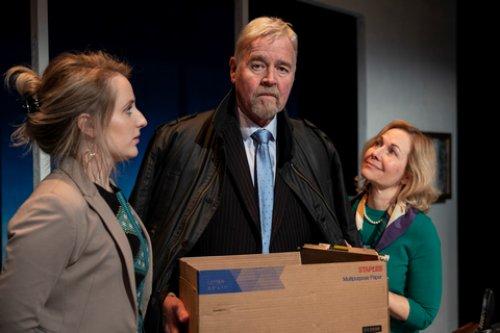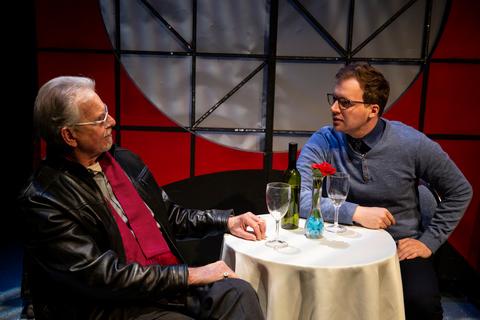Shareholder Value
This drama about a conglomerate business striving to survive following the 2008 financial meltdown is inspired by the General Electric debacle.

Kristen Tripolitis, Dennis Holland and Debbie Bernstein in a scene from Tom Attea’s “Shareholder Value” art Theatre for the New City (Photo credit: Maria Baranova)
[avatar user=”Mark Dundas Wood” size=”96″ align=”left”]Mark Dundas Wood, Critic[/avatar]
Jerry Ingram (Dennis Holland), the CEO of conglomerate Total Electric (TE), wears the same blue shirt and sea-green tie throughout much of Shareholder Value, Tom Attea’s new play about the 2008 financial crisis and its aftermath. Other characters have costume changes during the course of the play’s decade-long span, but Jerry sticks pretty much with the one look. Perhaps this is simply because the character is onstage so much of the time that costume designer Desiree Conton couldn’t find opportunities for him to change frequently. Or maybe it was a deliberate decision on the part of director Mark Marcante, meant to suggest that this powerful but faltering executive is consistent to a fault—that he’s stuck in a rut.
The play deals with the attempts of Jerry and TE president Don O’Day (Matt Gorsky) to salvage the organization (which, according to the production’s press release, is modeled on General Electric) after the big bust in late 2008. Employees are dismissed, components of the organization are spun off, and TE even moves its corporate headquarters to a different city in order to stay afloat. Eventually the corporation reaps benefits from a government bailout. However, Jerry still cannot manage to turn things around.
Shareholder Value comes off a bit like those online tutorials that everyone working in a large company these days must periodically complete—on subjects ranging from diversity to sexual harassment to business ethics. The not-so-nuanced characters in these digital narratives face workplace dilemmas that may be important, but that are also pretty basic. Dialogue in such tutorials is largely expositional. The scenarios may be real, but they’ve been invented primarily to make a point.
Attea’s point concerns business models that are overly focused on the needs of shareholders, rather than on those of management and employees. But the play is curiously bloodless. Strong plays about the ferocity of capitalism—from Arthur Miller’s Death of a Salesman to David Mamet’s Glengarry Glen Ross—take interest in the human equation. They focus on the personal anguish that the system can induce. Attea doesn’t delve that deeply here.

Joe Candelora and Benjamin Russell in a scene from Tom Attea’s “Shareholder Value” (Photo credit: Maria Baranova)
Jerry Ingram seems to skirt anguish. In any case, he keeps his cool as the company drifts toward disintegration. He and his wife, Angela (Debbie Bernstein), never have cross words with each other, even as his position as CEO becomes endangered. (Apparently, the Ingrams are not forced to relocate along with the company.)
Similarly smooth is Jerry’s relationship with Don, whom he never suspects of disloyalty even when it becomes clear that his sidekick is being considered for CEO if and when Jerry is ousted. (True enough, Jerry himself has planned to make Don his successor. But the idea that anyone believes lifelong second banana Don would make a good CEO candidate is faintly implausible.) In one scene, Attea hints that the pressures in Jerry’s professional life may be driving him into a romantic affair with his administrative assistant, Emily Adams (Kristen Tripolitis), but nothing ever really comes of this.
The one side of the story in which the conflict gets a bit juicy involves the machinations of an “activist shareholder,” the pretentious and contemptuous Curt Preston (Benjamin Russell), who enlists TE board member and disgruntled former executive Bill Hill (Joe Candelora), to help get rid of Jerry. Bill even drops the script’s single f-bomb. (If this were a Mamet play—or real life—the monosyllabic profanity would be tossed about incessantly.)
Attea’s script for the most part takes a realistic tack, although, at points, it turns fanciful with the mystical appearance of the man who founded TE: Thomas Edison (Bill McAndrews). The playwright’s impulse to inject a comedic and satirical quality into the proceedings with this character may have been a good one. Unfortunately, the scenes with Edison are so infrequent that they only serve to create a kind of inconsistency in overall style and tone.

Debbie Bernstein, Dennis Holland and Bill McAndrews as Thomas Edison in a scene from Tom Attea’s “Shareholder Value” (Photo credit: Maria Baranova)
Despite the somewhat dry quality of the script, the actors, by and large, do good work. Vocally, Holland sounds precisely like a man to the boardroom born. He also looks the part. Standouts among the supporting players include Bernstein as Angela, who projects an easygoing likability, and Candelora’s Bill Hill , who shows some real fire. Also on the plus side: McAndrews’ physical resemblance to Thomas Edison is striking.
Director Marcante has designed the utilitarian set. Various corners of the large playing area are designated for various locales: the TE offices, Jerry and Angela’s home, a local restaurant and watering hole. Alexander Bartenieff, the show’s lighting designer, is tasked primarily with helping keep each of these areas distinct. He succeeds.
Alex Santullo has created valuable video projections that help cue the audience as to when in the decade-long timeline each scene unfolds. Some of the graphics, however, look like title cards for a Lillian Gish silent. Arthur Abrams’ incidental music, meanwhile, tends to sound like background scores from mid-twentieth-century training films: the aural equivalent of stock footage.
In sum, while Shareholder Value may offer people who work in or around conglomerate businesses some food for thought about corporate structure and management, even they will likely hunger for something a bit more dramatically gripping.
Shareholder Value (through April 14, 2019)
Theater for the New City, 155 1st Avenue, in Manhattan
For tickets, call 212-254-1109 or visit http://www.Smarttix.com
Running time: 95 minutes with no intermission






Leave a comment